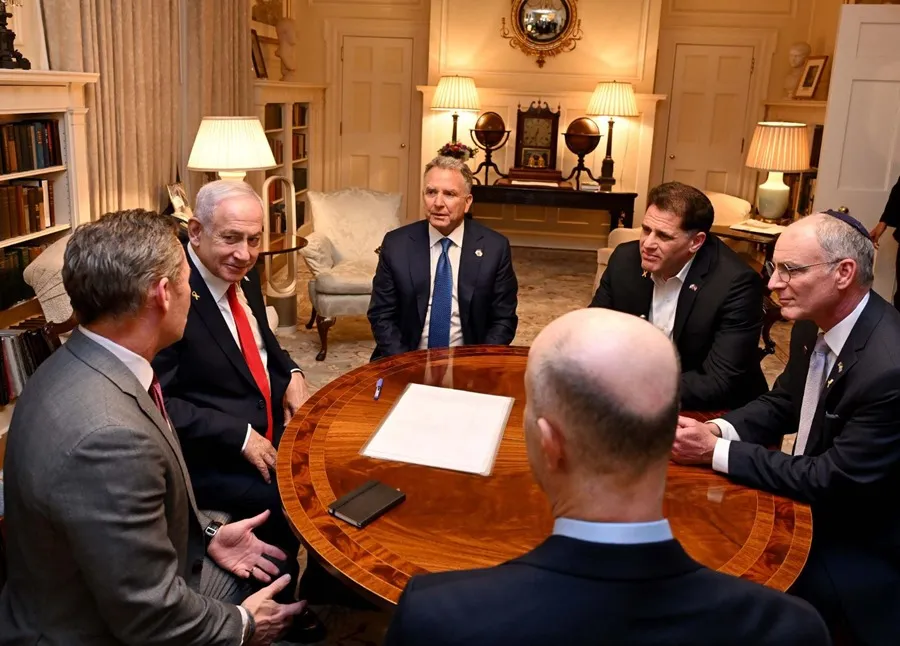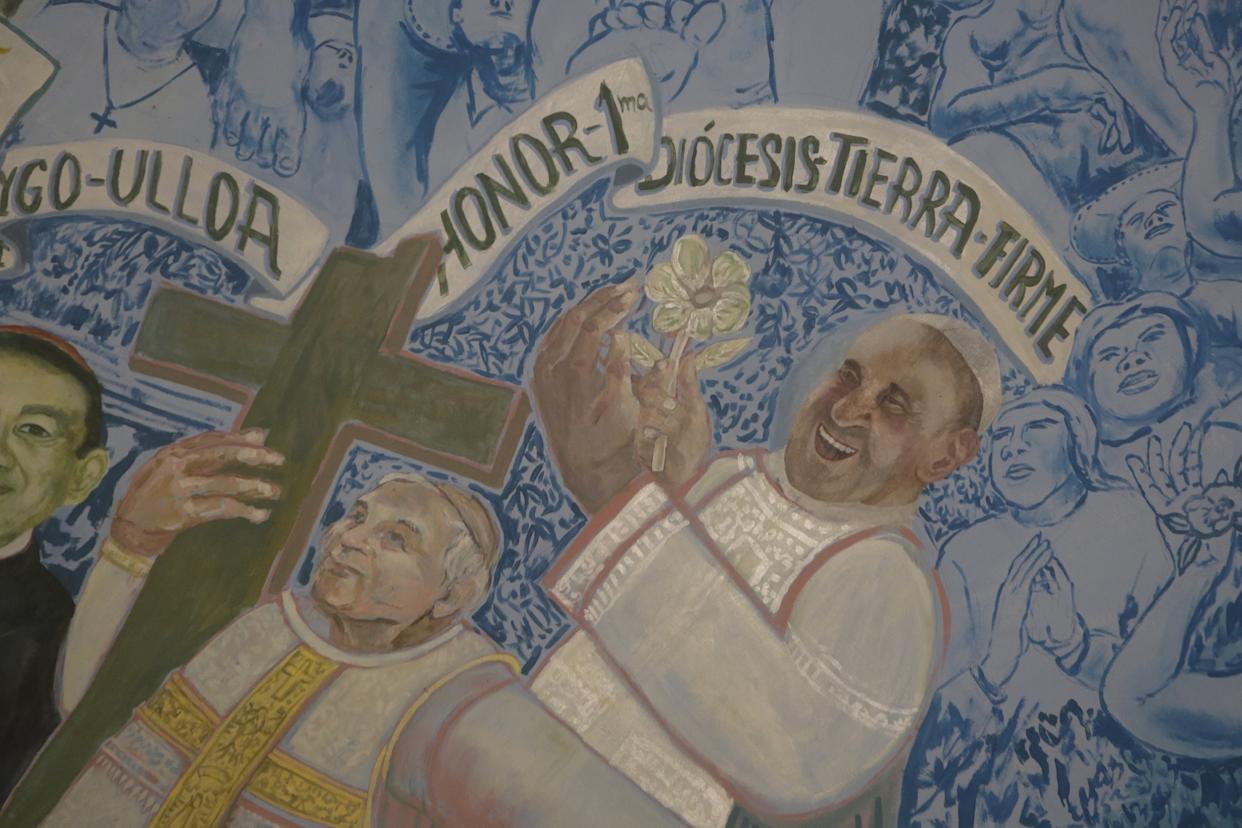International
Trump receives Netanyahu in a gesture of support, with Gaza and Saudi Arabia on the agenda

US President Donald Trump will receive Israeli Prime Minister Benjamin Netanyahu at the White House on Tuesday at his first meeting with a foreign leader since his return to power, and with the future of Gaza and the possibility of a normalization agreement with Saudi Arabia as key issues on the agenda.
The appointment represents international support for Netanyahu, especially after the arrest warrant of the International Criminal Court (ICC), whose jurisdiction Washington does not recognize and whose decision has strongly condemned.
Both leaders are expected to address a wide variety of issues, including the future of the Gaza Strip, the normalization of relations between Israel and Saudi Arabia and the growing tension with Iran, which attacked Israel twice with missiles and drones last year.
This Monday, in statements to the press at the White House, Trump was skeptical about the possibility of a lasting ceasefire in Gaza.
“I have no guarantees that peace will be maintained,” he said on the eve of his meeting with Netanyahu.
The meeting between Trump and Netanyahu will coincide with the beginning of indirect negotiations between Israel and Hamas for the second phase of the truce agreement, which provides for the release of all Israeli hostages in Gaza and the establishment of bases for the definitive end of the war.
Hamas, which has reaffirmed its control over Gaza since the beginning of the ceasefire on January 19, has warned that it will not release more hostages until the end of the war is agreed and the Israeli forces withdraw from the enclave.
Netanyahu, for his part, faces growing pressure within his government coalition with far-right ministers such as Bezalel Smotrich threatening to overthrow the Executive if, once the first phase of the truce is concluded, the fighting in the Strip does not resume.
Trump, for his part, has not given clear signals about what his strategy will be in the Gaza conflict. Although he is a strong ally of Israel, the Israeli press assures that it has already told Netanyahu that it does not want the country to resume fighting in the Strip.
Trump has promised to end the wars in the Middle East and, in addition, has attributed the merit of having facilitated the current ceasefire agreement, which in its first phase allowed the release of 13 Israelis and 5 Thais in exchange for more than 500 Palestinian prisoners.
However, his apparent intention to end the war does not imply improvements for the Gazati. On the contrary, since his return to power he has lifted sanctions against Israeli settlers accused of violence against Palestinians and has thawed a shipment of heavy bombs to Israel, paused by his predecessor, Joe Biden (2021-2025).
During his first term, Trump already made several decisions in favor of Israel, such as the transfer of the US embassy to Jerusalem, the recognition of Israeli sovereignty over the Golan Heights and the negotiation of the Abraham Agreements, which allowed Israel to establish diplomatic relations with several Arab countries.
Beyond the truce in Gaza, Trump seeks to take advantage of the meeting to relaunch his aspiration to reach an agreement between Israel and Saudi Arabia, a goal that he already pursued in his first term (2017-2021) and that the Biden Administration also tried unsuccessfully.
Saudi Arabia has shown interest in signing an agreement with Israel, but has made it a condition to receive strategic guarantees from the United States, such as a defense pact, and has made it clear that there will be no agreement without the creation of a Palestinian State.
The form that an eventual Palestinian state would take is still to be defined, especially due to the position of both Trump and Netanyahu with Israel.
In recent days, the US president has insisted that Jordan, Egypt and other Arab countries should accept more Palestinian refugees from Gaza, a proposal that has been flatly rejected by both several Arab nations.
Netanyahu, for his part, rejects any attempt to use the formula of the “two-state solution” to resolve the conflict.
Beyond the topics to be discussed, attention will be focused on the gestures between the two leaders and on the current state of their personal relationship.
During Trump’s first term, both maintained a close relationship, but later the former US president felt betrayed when Netanyahu congratulated Biden on his victory in the 2020 elections, in which Trump denounced an alleged electoral fraud without evidence.
Since then, Netanyahu has sought to rebuild the relationship with Trump. In July of last year, he traveled to the US president’s mansion in Florida to meet with him before the elections and, after his victory in November, he was one of the first leaders to congratulate him.
International
DHS Secretary Kristi Noem’s Purse Stolen in D.C. Restaurant Heist

The purse of Kristi Noem, Secretary of the Department of Homeland Security, was stolen on Sunday night at a restaurant in Washington, D.C., Fox News Digital confirmed through several agency sources.
The handbag, taken by a white male wearing a mask, reportedly contained $3,000 in cash along with personal documents, including her passport, keys, driver’s license, and DHS badge, according to an agency spokesperson.
“Her entire family was in town, including her children and grandchildren. She was celebrating her retirement by treating them to dinner, activities, and Easter gifts,” the spokesperson added.
Crime continues to be a significant issue in the U.S. capital, particularly theft. However, violent crime reached its lowest level in 30 years last year, according to the Office of the Attorney General at the time.
International
Pope Francis: The Quiet Architect Behind the U.S.-Cuba Thaw

When then-U.S. President Barack Obama and Cuban President Raúl Castro announced the reestablishment of diplomatic relations in December 2014—after decades of hostility—there was a third figure present in both speeches: Pope Francis.
This thaw in U.S.-Cuba relations—later reversed by Donald Trump—was the result of behind-the-scenes negotiations personally encouraged by Pope Francis, who passed away on Monday at the age of 88, just over a year after becoming head of the Catholic Church.
Upon learning the news of the breakthrough, the pontiff humbly stated, “This was made possible thanks to the ambassadors and to diplomacy,” which he called “a noble, very noble job.”
In 2015, months after the announcement, Raúl Castro visited the Vatican and met with the pope. Over time, Castro developed a fondness for Francis that he never had for his predecessors, Benedict XVI and John Paul II. “If the Pope continues talking like this, sooner or later I’ll start praying again and return to the Catholic Church—and I’m not joking,” said the younger Castro, who, like his brother Fidel (1926–2016), had been educated by Jesuits—the same order to which Pope Francis belonged.
Pope Francis visited Cuba later that year. Just days before his arrival, the Cuban government announced the pardon of 3,522 common prisoners as an act of clemency.
While in Havana, the pope met with Fidel Castro, who gave him a first edition of the book Fidel and Religion by Brazilian friar and liberation theologian Frei Betto.
Criticism from the Opposition
Francis’s diplomatic approach also drew criticism from parts of the Cuban opposition. In a 2022 interview with Univision, the pope revealed he had “a human relationship” with Raúl Castro.
International
Dominican Republic Declares Three Days of Mourning for Pope Francis

Dominican Republic President Luis Abinader has declared three days of national mourning starting Tuesday following the death of Pope Francis, who passed away on Monday at the age of 88 in his residence at the Casa Santa Marta.
In an official decree, Abinader highlighted the pope’s legacy “as a global leader who promoted significant reforms within the Catholic Church and was known for his humility, openness to dialogue, and commitment to peace among nations.”
During the mourning period, the national flag will be flown at half-staff at military facilities and public buildings.
According to a statement from the Office of the Presidency, although Pope Francis never visited the Dominican Republic during his papacy, he maintained a close relationship with the country. He expressed solidarity and empathy during difficult times, including offering prayers for the victims of the recent tragedy at a Santo Domingo nightclub on April 8, which claimed 232 lives and left more than 180 injured.
-

 Central America5 days ago
Central America5 days agoNicaraguan Exiles to Mark 7th Anniversary of 2018 Protests with Global Commemorations
-

 International5 days ago
International5 days agoDominican ‘False Hero’ Arrested for Faking Role in Nightclub Collapse That Killed 231
-

 Central America4 days ago
Central America4 days agoUN complaint filed against Costa Rica over detention of migrant children
-

 International4 days ago
International4 days agoACLU seeks emergency court order to stop venezuelan deportations under Wartime Law
-

 Central America2 days ago
Central America2 days agoSenator Van Hollen Meets with Deported MS-13 Member in El Salvador; Trump and Bukele React
-

 International3 days ago
International3 days agoThousands rally nationwide against Trump’s threat to U.S. democracy
-

 International2 days ago
International2 days agoPope Francis Appears for Easter Blessing, Calls for Peace and Religious Freedom
-

 Central America19 hours ago
Central America19 hours agoCardinal Rodríguez to Attend Funeral of Pope Francis: “He Was Very Dear to Me”
-

 Central America19 hours ago
Central America19 hours agoNicaragua’s Ortega and Murillo Mourn Pope Francis, Acknowledge ‘Difficult’ Relationship
-

 International19 hours ago
International19 hours agoDominican Republic Declares Three Days of Mourning for Pope Francis
-

 International19 hours ago
International19 hours agoDHS Secretary Kristi Noem’s Purse Stolen in D.C. Restaurant Heist
-

 International19 hours ago
International19 hours agoPope Francis: The Quiet Architect Behind the U.S.-Cuba Thaw















